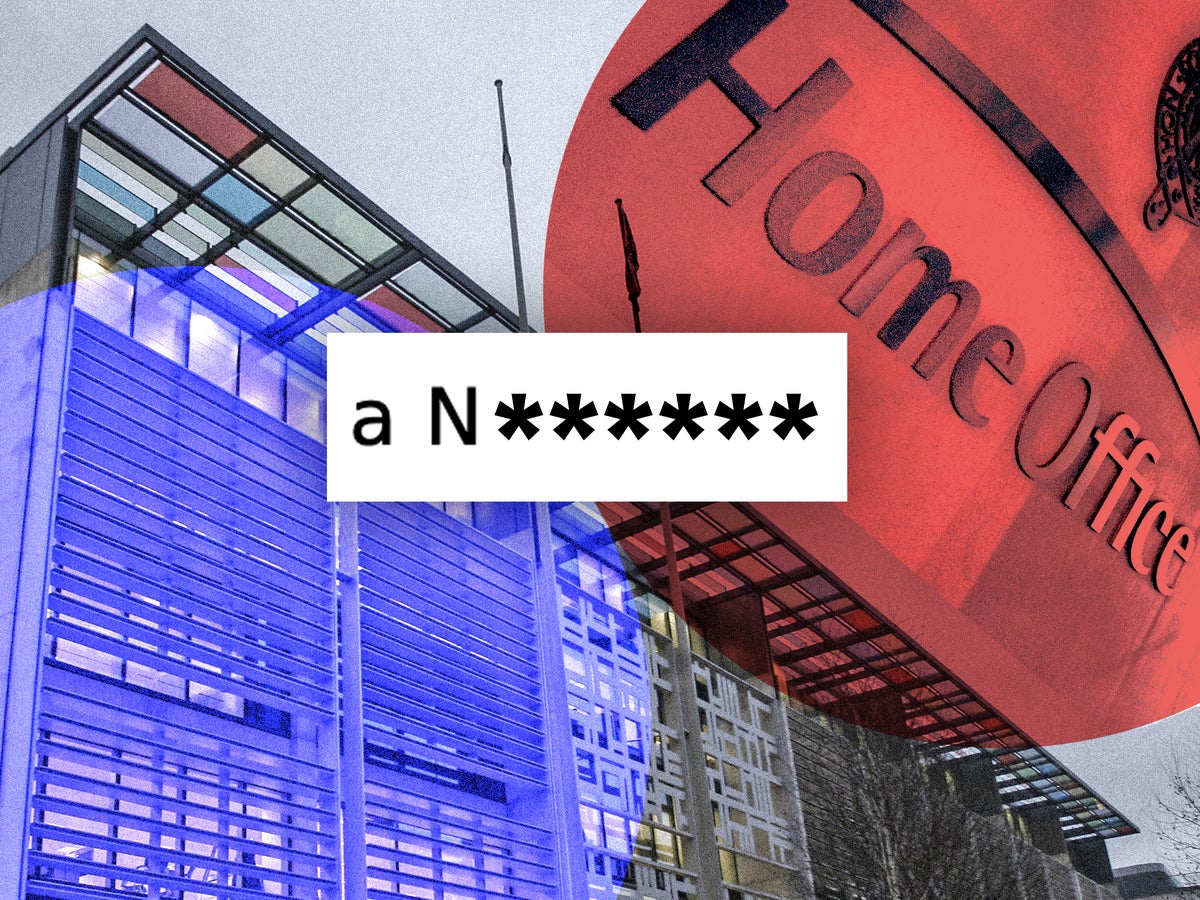
More racist slurs have been found in government documents as ministers face calls for a full-scale inquiry following an investigation by The Independent.
Officials outlining two separate immigration tribunal decisions, each concerning the right of an asylum seeker to remain in the UK, refer to the applicants’ ethnicity as “N*****d”.
In the first instance, a child, 17, who had fled Somalia for fear of persecution, was at the centre of an appeal hearing after the Home Office decided he was not entitled to refugee status and should be removed from the UK.
“He is a member of the Tunni clan,” the official document reads, “[...] a N*****d group federated to the Tunni of Brava as vassals.”
Published in 2005, the document was updated in 2013, however the slur is still visible online, raising questions about why this language has been used and why it remains unaddressed years later.
A second tribunal document, also dated 2005 and updated eight years later, contains the same offensive word. The document relates to a battle over a Somalian person’s right to remain in Britain.
“Physical appearance: [...] N*****d features, particularly the hair,” the paperwork reads.
The latest revelation comes after The Independent revealed that a string of slurs referring to Black people had been discovered in:
- Department for Work and Pensions guidance for doctors assessing benefits claimants
- A Met Office report about the impact of solar radiation on human health
- The UK government’s Foreign Office website
- The gov.uk website
- The Royal Collection Trust’s catalogue
Following our reporting on the n-word scandal, the vice-chair of the all-party parliamentary group on race, Kim Johnson MP, wrote to Cabinet Office minister Jeremy Quin demanding an investigation.
“It is utterly outrageous that such language is still being used in official Government documents,” her letter read.
Writing for The Independent, she added: “The recent discovery of the repeated use of the n-word in government documents and the royal collection has caused widespread outrage. Despite attempts to downplay this as nothing more than a few mistakes that have slipped through the net, it is clearly only the tip of the iceberg.
“Such language goes far beyond the offensive. It exposes the impact of generations of dehumanising government policies, used in decisions that have the potential to have a devastating impact on the lives of Black and minority ethnic people in this country.”
Ms Johnson demanded a “full and thorough review” of all government documents, saying she is “not confident” that all slurs have been removed from official papers.
She has also written to Caroline Nokes, chair of the women and equalities select committee, asking her to raise the issue with the minister for women and equalities. On Tuesday Ms Nokes wrote to Kemi Badenoch about the matter, The Independent understands.
Green Party MP Caroline Lucas also raised the issue in a letter to Mr Quin, who said he will be writing to his permanent secretary colleagues to remind them of government guidance on writing about ethnicity and asking them to ensure that it is easily accessible to all employees within their departments and associated organisations.
“We do not tolerate racist, homophobic, sexist or any similarly unacceptable language in any form, including in Government documents or on our webpages,” Mr Quin’s response read.
The presence of offensive language in UK immigration tribunal paperwork raises questions about the link between government policy on people from minoritised communities and the language used to describe them. Numerous studies have shown that Black, Asian and minority ethnic communities fare worse within the UK’s immigration system.
In February, the government’s own equality impact assessment of the hostile environment policy found that migrants affected by it are more likely to be of southeast Asian or Black ethnicity. Meanwhile, Black people are overrepresented in the UK’s judicial system.
The Independent has approached the Judicial Office for comment.
Instances of offensive language reported by The Independent within the past fortnight prompted Rishi Sunak’s official spokesperson to denounce the presence of the n-word as “inappropriate and offensive”, though Downing Street said it was “confident” that the word did not appear in any other documents and rejected calls for an investigation.
Since then, however, The Independent has uncovered more instances of the word “N*****d” in the government’s administrative paperwork.
A chorus of politicians and campaigners have criticised the use of offensive language in these documents, from crossbench peer Simon Woolley and campaigner Patrick Vernon to Tory MP Peter Bottomley, the longest-serving House of Commons member, and The Runnymede Trust.
Political activist Professor Gus John said: “N*****d ... does not connote a geographical place or region, but a people whose standing in the human realm has been defined as primitive, undeveloped, backward and not as human as the rest of humanity, thus qualifying to be used as chattels, or for experimentation by eugenicists.”







